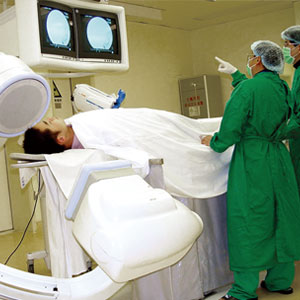
Tumor minimally invasive therapy is also known as minimally invasive interventional therapy. There are many advantages with such therapy. For starters, trauma is small and skin incision is only about 2mm. Targeting is accurate and can be effective on tumor directly. Its damage to normal tissue is minor. Recovery is very quick. The patient can move normally 12 hours after operation, and discharged from the hospital in 5-7 days. It is repeatable and according to the situation of disease and treatment, it can be carried out multiply and repeatedly in different stages. It can also be applied with various technologies, for example, primary liver cancer, firstly it should use hepatic artery embolization to close tumor vessel maximally and then use argon helium cryogenic refrigeration technology to reduce tumor and tumor load within short time. Finally, biological immune therapy is applied so as to achieve the ideal goal. Thus, modern medicine combines Hi-Tech skills of congenerous, superposable and complementary treatments.
Scope of Application
Vascular Intervention: lung cancer, esophageal cancer, liver cancer, liver metastasis, gastric cancer, kidney cancer, colon cancer, pancreatic and duodenal cancer, cervical cancer, ovarian cancer, bladder cancer, limb cancer etc.
Non Vascular Interventional: solid tumor with percutaneous biopsy, lung cancer, liver cancer intratumoral injection, esophagus stent implantation of esophageal cancer and biliary tract stent implantation of bile duct cancer.
Therapy Mechanism
Interventional therapy of malignant tumor includes vascular interventional therapy and non-vascular interventional therapy.
Vascular Interventional Therapy
It mainly targets the artery of cancer. The anti-cancer drugs are injected into the cancerous area to kill cancer cells directly. Or artery of cancer is embolized to block nutrition supplement of cancer so as to narrow the tumor. Or double interventional is to be conducted to combine anti-cancer drugs with embolic agent to inject into the targeted artery, which can block blood supply and retain drugs in the tumor area in order to kill cancerous tissues.
Non-vascular Interventional Therapy
Guided by medical imaging equipments such as X ray, CT, B Ultrasound and MRI. Affected organs of tumor is diagnosed and treated via various instruments. It mainly includes percutaneous puncture biopsy, luminal dilatation and stent angioplasty, percutaneous intratumoral injection, percutaneous multi electrode radiofrequency ablation and etc…



